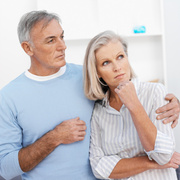 Stockbyte/Thinkstock
Stockbyte/Thinkstock
Some people may think that once a woman hits menopause the best part of her life is over. People who think this way are (hopefully) not postmenopausal women.
Because plenty of us know better. Things look somewhat different on this side of the menopause line. Fortunately they generally look better.
Many postmenopausal women would beg to differ with the image many (younger and therefore uninformed) people have of them. If you are a young woman, that is an ominous future you are predicting for yourself in a few years.
Plenty of postmenopausal women feel younger in their fifties than they did in their forties. They're not worried about becoming pregnant, and painful periods may be a thing of the past for the first time since their teens.
This can be a long-awaited dream come true. But the picture isn't necessarily ideal, at least for women with an active sex life with more than one partner, or whose partner is not monogamous.
Sexually transmitted diseases do not respect age. Postmenopausal women are just as vulnerable as younger woman.
Perhaps more so. Younger women grew up with the spectre of STDs, but many of the older set did not have that experience.
Condom use meant pregnancy protection in the olden days. Now that pregnancy is no longer possible, some women assume they don't need condoms.
And some are catching sexually transmitted diseases as a result. Some STDs don't make themselves visible with symptoms in women.
But when chlamydia, genital herpes, gonorrhea, HPV, HIV and syphilis go unchecked, things can get dangerous. Burning upon urination, genital itching, sores or rashes are red flags requiring immediate treatment.
How has this situation managed to spread so far and wide among a group of seniors who are surely old enough to know better?
Never underestimate the embarrassment factor in forming an effective barrier between doctor and STD-carrier. Some seniors may be extreme modest about talking to a doctor abiout such things, but many are not the least bit prudish.
They just didn't think STDs had anything to do with them. It will come as an even greater surprise to some that they may be at even higher risk than their younger counterparts for sexually transmitted disease.
Thinning of tissue in the vaginal wall of an postmenopausal woman can lead to tiny tears from intercourse. A possible tendency to experience less natural lubrication compounded with this more fragile, thinner tissue can create an environment where transmission of an STD is more likely to occur.
An older immune system is less able to protect against infection. This age-related difference in immune systems can also make for less noticeable symptoms of an STD.
A senior who had chronic health issues before contracting an STD may begin to have more trouble in managing that health issue afterward. The senior can also find themselves more vulnerable to other health problems as a result of sexually transmitted disease, or treatment for the STD.
Sources:
STDs, Vaginal Dryness and Menopause: What Every Woman Should Know
http://www.34-menopause-symptoms.com/vaginal-dryness/articles/stds-vagin...
Menopause And STIs
http://www.womens-health.co.uk/menopause-and-stis.html
Sexually Transmitted Diseases (STDs) in the Elderly
http://www.seniorhealth365.com/2012/02/13/sexually-transmitted-diseases-...
Visit Jody's website and blog at http://www.ncubator.ca and http://ncubator.ca/blogger






Add a CommentComments
There are no comments yet. Be the first one and get the conversation started!